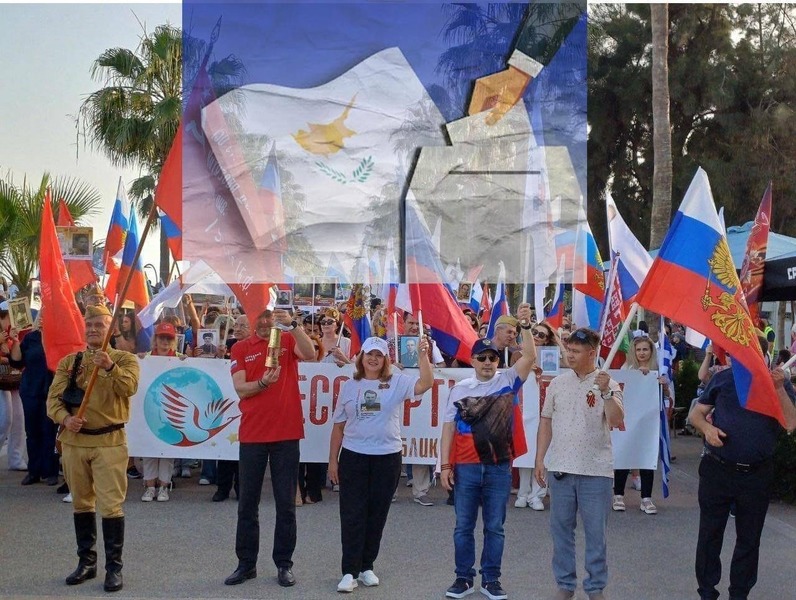For the first time since the implementation of municipal administrative reform, a big election to the European Parliament and municipal bodies will take place in Cyprus on June 9. In total, there will be eight different elections to representative and executive authorities in Cyprus. According to the Cyprus Electoral Commission, 7,280 candidates are running for 3,227 positions.
Cyprus will be represented by six deputies in the European Parliament from 12 parties and two independent candidates. Five candidates will be the heads of the municipal districts of Nicosia, Limassol, Paphos, Larnaca and Famagusta, 17 Mayors will be elected to municipalities in the free areas and nine Mayors in the occupied municipalities in exile. As a result of the voting, there will be 93 Deputy Mayors, 316 members of Municipal Councils in the south and 127 in occupied municipalities, 212 members of School Councils, 285 Community Leaders in free areas and 138 in occupied communities. And finally, 1,464 members of Public Councils in the free territories and 552 — in the occupied municipalities.
Candidates with Russian roots
Such wide-ranging elections in Cyprus at various levels of government could not be ignored by Russia, which has a long-standing and sustainable interest on the Mediterranean island. This is especially true for elections to the European Parliament, where it is possible to put forward its insider under favorable conditions. Moreover, municipal elections are of considerable interest to Russia too.
If earlier, about 10 years ago, Russia interfered in the electoral process in Cyprus with the help of donations to political parties and resource support for individual candidates, then in 2017 it tried to create its own Ego o Politis Party, which planned to fight for seats in the European Parliament and the Cypriot House of Representatives. This project failed and was closed in 2021. A Russian woman with Cypriot citizenship, Yulia Khovrina, from the hastily created United Republican Party of Cyprus took part in the 2023 Presidential elections. The candidate won less than 1 % of the vote and is now in political oblivion.
But no electoral failures stop Russia in Cyprus; its agents stubbornly and systematically participate in all elections in Cyprus, using all available methods.
According to the Russian Embassy in Cyprus, there are 65,000 Russian-speaking voters with Cypriot passports living in the country who have the right to vote in elections. These data, however, are not supported by any relevant statistics and are likely the pre-election “sale” of Russian votes to local politicians. According to other unofficial data, there are no more than 17 thousand voting Russians in Cyprus.
The first to be sent to participate in the elections to the European Parliament was Russian Dmitry Apraksin, an employee and lecturer at the University of Nicosia, who has settled on the island since the 90s.
The Russian Ambassador to the Republic of Cyprus, Murat Zyazikov and the Russian TASS propaganda agency are engaged in PR and public support for Dmitry Apraksin in the upcoming elections. It is unclear what was the Kremlin’s political strategy, but the Russian candidate for the European Parliament was the first in the electoral list from the non-parliamentary marginal Party of Hunters — Active Citizens. A university employee with a smooth-spoken voice of an ideal “Baby Monitor” presenter does not correspond to the screamed brutality of the local party of hunters, let alone the EU values. In general, he seems to avoid his party colleagues: he does not participate in joint election events, does not mention them anywhere and does not publish joint photos.
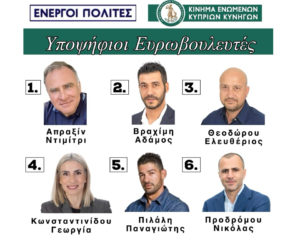
In the European Parliament, Apraksin intends to demand the lifting of EU sanctions from Russia. The article “Politics for the Poor” provides detailed information about his campaign article “Revive Leviathan.”
Another candidate, but this time for the local elections in Cyprus, who is openly supported by the Russian authorities, is the rising star of Russian-Cypriot youth politics, a graduate of Russian language courses and a native of Greece, Vladimir (Vladimiros) Gkorin.
The young candidate is running for the Green parliamentary party in the municipal elections in Nicosia. “A bright and talented member of the youth club of Russian compatriots in Cyprus,” the ambassador of the Russian language in the world from Greece and Cyprus, ecologist, actor, teacher of robotics at the Russian Center for Science and Culture in Nicosia, coordinator of the worldwide (but little-known) Volunteers of Victory Movement in Cyprus, in early March 2024, he participated in the Russian World Festival of Youth 2024 in Sochi. Just like candidate Apraksin, candidate Gkorin is being advertised by the Russian propaganda TASS agency. Thus, in April this year it was reported that after the festival in Sochi, Vladimir Gkorin applied for Russian citizenship. Russian Ambassador to Cyprus Zyazikov warmly welcomed the young politician’s decision to become a Russian.
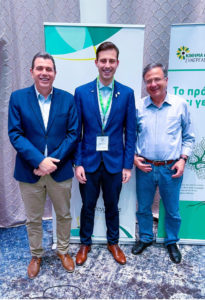
Gkorin (in the center)
Another Greek Cypriot with Russian roots who is not publicly supported by Russian officials is Nicosia Municipal Councilor Valerios Daniilidis. He is running as an independent candidate for the post of Deputy Mayor in the Ayios Dhometios district of Nicosia and is formally distanced from the Russians. Valerios was behind the creation of the Russian Ego o Politis Party, was a member of its political council and provided help to many Russians in obtaining Cypriot citizenship.
The Cypriot Stanislav Kozlov, who is unknown to the public, is also participating in the municipal elections in Nicosia from the EDEC Party.
There are many pro-Russian candidates with Russian-Pontic and Georgian roots in the municipal elections in Paphos. Pontic Greeks, who emigrated en masse from the Soviet Union and then Russia to Greece and Cyprus in the 1990s, also represent a significant part of the former USSR population on the island. This group positions itself as ethnic Greeks living in Cyprus.
“In the 2024 municipal elections, for the first time in the history of Cyprus, Greek immigrants with Russian roots are participating as independent candidates from the Paphos Greek emigrant movement,” Liana Kesidou, a candidate for Paphos municipal councilor, said in a pre-election statement.
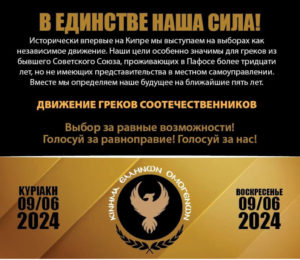
Kesidou, on behalf of the movement of Greek emigrants, also disseminated her campaign messages on social networks, calling to vote, otherwise “a blind choice could be fatal for all of us.” Let us note that campaigning for the Cypriot elections is in Russian language. An example is this instruction, which explains where “crosses” are placed in the ballot papers, and is made, first of all, not for native Cypriots, but for Russian-speaking people.
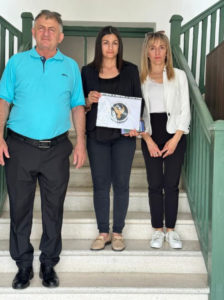
Greek teacher Maria Simeonidou became a candidate for the Paphos municipal council together with the Russian Kesidou. The Chairman of the Greek-Pontic Agios Trifonos society, Raoul Ivanovich Tsakhidis, a native of the Georgian SSR, a citizen of Greece and Cyprus, is running for the Paphos School Council.
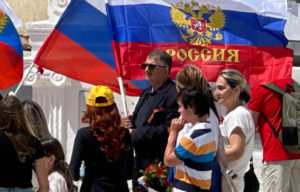
Raoul Tsakhidis (in the center)
Raoul Tsakhidis immigrated to Greece in 1993, and in 1998 he moved to Cyprus. In 2004, he headed the Pontian Greeks Society in Paphos. According to our data, he is close to the Association of Greek Public Associations of Russia (AGPAR), whose President is Ivan Savvidi, the Kremlin’s oligarch of Greek origin.
In April 2022, a week after the full-scale invasion of Russian troops in Ukraine, the Agios Trifonos Society, led by Tsakhidis, together with the Russian Cultural Center, the Coordinating Council of Russian Compatriots and the Russian Embassy in Cyprus organized a rally in Paphos in support of Russia. This massive event was attended by several hundred residents of Paphos and pro-Russian activists from other cities.
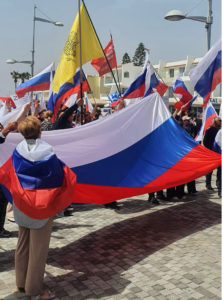
Rally in Paphos, April 2022
This group of candidates from Paphos was the first to unite under its banner the ethnic group of Pontic Greeks with Russian roots living in Cyprus.
Another candidate in the elections is Mikis Kotanidis. He is running for the position of Councilor in the Paphos municipality from the left-wing AKEL Party, and has a Russian passport in the name of Mikis Kotanov. During the election campaign, Mikis became known for his slogan “Together we are strong!” in the presidential elections in the Russian Federation in March of this year. In one of his leaflets, Kotanidis indicated the mail service mail.ru. It’s surprising that his campaign materials didn’t include a Russian phone number…

Another interesting Russian woman in the elections in the Paphos’ Tala — Yulia Tseplokova-Paraskeva, an interpreter and teacher of the Greek language. In the Russian-speaking community, the lady introduces herself as Julia Friday. Yulia closely, but not publicly, cooperates with the Russian Embassy in Cyprus and the Russia House, whose events she regularly attends. In private conversations, Tseplokova boldly says that she works for the FSB of the Russian Federation.
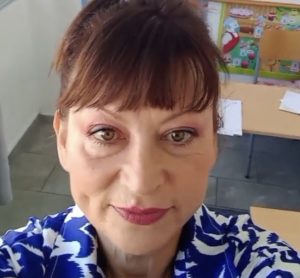
Yulia Tseplokova-Paraskeva
At least 5 more candidates with Russian roots are participating in municipal elections for various government bodies in Paphos.
In Limassol, the MGIMO graduate, husband of the 2023 Cyprus presidential candidate, lawyer and businessman Nikolay (Nicholas) Khovrin-Komnenos, is vying for the post of Municipal Councilor of Germasogeia (densely populated by Russian speakers). In the spring of 2020, Khovrin-Komnenos announced the creation of a new Christian Republican Party of Cyprus and became its leader. However, he is participating in the current elections from the United Republican Party of Cyprus (E.R.K.C.), created by his wife. We wrote in detail about this family-political union in the article Communists of Cyprus and Moscow agents.
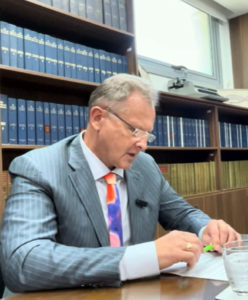
Nikolay (Nicholas) Khovrin-Komnenos
Funny Fifi from social networks
An interesting Cypriot is participating in the elections to the European Parliament, who may well receive the cherished seat in parliament based on the voting results. This is 24-year-old Cypriot blogger, influencer, independent candidate for the elections to the EP, Fidias Panayiotou (or simply Fifi for the subscribers on social networks). The latest survey show that he is fifth in the ranking of parties and candidates with 8.7 %.
Fidias admits he knows nothing about politics, but says he cannot accept the continued rule of “nerds” in Brussels. He plans to attract young people to participate in elections, to develop AI, social networks, the Bitcoin economy and other modern ideas.

In January 2024, Panayiotou appeared on air at a local TV station wearing shorts and three ties around his neck. In February, he already visited Strasbourg and took photographs outside and inside the European Parliament.
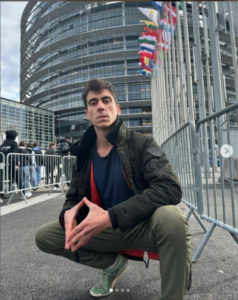
At a nomination ceremony for the elections to the EP in April 2024, he came to the election commission with the pope-priest, who serves in the Church of Saints Cyprian and Justina in the village of Menico. Let us note that the church in Meniсo is a favorite place of pilgrimage for Russians; it was completely restored with money from Russian sponsors.
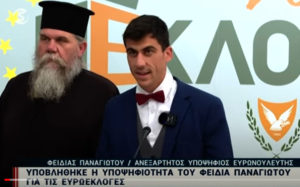
At the end of 2023, ahead of his announcement about the will to run for the European Parliament in February 2024, Fidias’ YouTube channel collected its first million subscribers, and by May 2024, his YouTube channel amounted about 2.8 million subscribers. According to the blogger Fifi, he has a total of 5 million subscribers.
In June 2023, Fidias traveled to Russia. A Cypriot blogger traveled from Vladivostok to Moscow by train in 7 days and made a funny post about his journey. On his second channel, he posted another story — with thoughts about Russia and Russians.
In its story, which sounds like a commercial, a photo of the President of the Russian Federation appears on the screen, for whom the International Criminal Court in The Hague issued an arrest warrant. Allegedly apolitical, the young Cypriot blogger Fidias informed his viewers that half of Russians supported Putin, while the other did not, and twice placing his portrait in the story with captions.
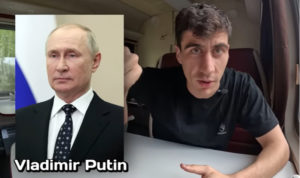
We do not yet know who financed Fifi’s trip to Russia and his visa support as a citizen of an “unfriendly country”, but Cypriot voters can ask their candidate about this directly on his blogs.
Immortal Russian propaganda
One of the tools for pre-election event marketing this year was the traditional propaganda event organized by the Russian Embassy in all cities of Cyprus — the celebration of Victory Day on May 9 with the main ritual of the modern Russian militaristic cult — the Immortal Regiment procession.
The main event took place on May 9, 2024, in Limassol, where most of the Russian-speaking residents of the island are lived. Lovers of “Russkiy mir” gathered there from all over Cyprus. The event was held under the auspices of the Russian Embassy and the Russian Center for Science and Culture in Nicosia (Rossotrudnichestvo representative office in Cyprus).
On the day of the events, the Russian Embassy and the RCSC used Facebook (banned in Russia) to announce a schedule with an appeal to their supporters to join them. There was a list of members of the “organizing committee” under the general title “Victory Day in Cyprus”.
The first in the list is the Coordinating Council of Russian Compatriots in Cyprus (CCRC). Russian organization of agents of influence with its headquarter in Moscow, created and financed by the Kremlin. The CCRC is headed by a candidate for the European Parliament from the marginal United Hunters of Cyprus — Active Citizens Party, Russian Dmitry Apraksin, mentioned above. Since the summer of 2023, after a meeting between the leader of the Hunters Party, Nicholas Prodromou, and the director of the CCRC, Alina Radchenko, the party began close cooperation with the Russian Cultural Center, Rossotrudnichestvo, CCRC and prepare for the 2024 elections.
Apraksin, together with CCRC, has been organizing all pro-Russian propaganda actions and events in Cyprus over the past two years, which probably should have helped in promoting this candidate for the elections. In his public statements, Apraksin supports Putin’s regime and the war in Ukraine, and also spreads Russian state propaganda and disinformation.
The second in the list of organizers is the Youth Club of Russian Compatriots in Cyprus — a branch of the RCSC in Nicosia. Its members are young Russian emigrants and citizens of European countries with Russian roots living in Cyprus. The most prominent member of the Youth Club is the aforementioned Vladimir Gkorin, a candidate for municipal elections in Nicosia, the RCSC activist, the organizer and host of pro-Russian mass events.
The third in the list of the “organizing committee” is Friendship and Cultural Relations Society “Cyprus-Russia,” headed by Harris Thrassou, a graduate of the Patrice Lumumba Peoples‘ Friendship University of Russia, former Minister of Transport, Communications and Works of Cyprus (2004–2007), Chairman of the Board of Cyprus Civil Engineers and Architects Association (CCEAA).
The next is the Cyprus Alumni Association of Soviet and Russian Universities, established in 1986 and currently unites about 2,000 people. This is the Cyprus branch of the World Alumni Association of Soviet and Russian Universities, created with the participation of Rossotrudnichestvo. The President of the Association is Anastasios Kouzalis, a physicist who graduated from the Patrice Lumumba Peoples‘ Friendship University in 1976 and his postgraduate studies. In Cyprus, Kouzalis held important positions in the Ministry of Education.
The list of organizers also includes the Community of Belarusian- Cypriot Friendship — the Cypriot branch of the Belarusian Society of Friendship and Cultural Relations with Foreign Countries. It is a branch of the Belarusian KGB, created for espionage and control of the Belarusian diasporas abroad, working closely with the Russian intelligence services.
The next is the All-Russian Public Movement “Volunteers of Victory”, created on Putin’s initiative and with the participation of the Russian government department of the Federal Agency for Youth Affairs (Rosmolodezh). The organization’s leadership consists of Putin appointees, State Duma deputies and government officials. The representative of this organization, Gkorin, was the host of the event on May 9.
The last among the members of the “organizing committee” is the International Russophile Movement, a pseudo-public organization recently created and financed by Moscow, uniting the Kremlin’s agents of influence around the world. The Cyprus branch of this front KGB office is headed by Mikis Philaniotis, a long-time agent of Russian influence, a participant in all, without exception, Russian information and propaganda special operations in Cyprus, a communist recruited while studying in the USSR. His main function is to make statements in Greek, prepared by Russian intelligence services, on behalf of the Cypriots, disseminating Russian state propaganda and disinformation. As a rule, these statements end up in the local media and have the desired impact on the public opinion of a part of Cypriot society. This is very important, especially in the pre-election period.
About five hundred Putin’s supporters from different parts of the island took part in the main event on the Limassol Embankment on May 9, 2024. These people strolled several kilometers along the central promenade of Limassol with symbols of Russian aggression authorized by local authorities (to the amazement of thousands of tourists from European countries who were not ready to see it, and local residents who were still not accustomed to “Russian Sabbaths”).
“Prominent figures” of Russian amateur performances in Cyprus were invited to participate in this propaganda event. At the head of the column was a man dressed in a military uniform of the Soviet army from the Second World War, with a red military banner and a dummy copy of Finnish Suomi submachine gun (PPSh).
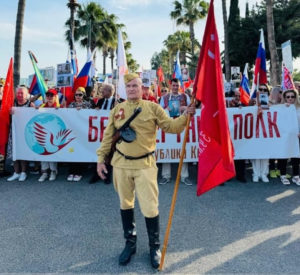
Alexey Smirnov
His name is Alexey Smirnov, the CCRS’ member, a leading actor of the Russian Ostrov Theater in Cyprus, directed by Olga Rybkina-Evangelou, the CCRS’ member, a member of the board of the Union of Russian Theaters Abroad. Let us recall that the Ostrov Theater is a permanent participant in all pro-Russian actions and events in Cyprus and is essentially a propaganda unit of the Russian Embassy and the Russian Cultural Center, providing, among other things, a cultural program in election campaigns.
There were employees of the consular department of the Russian embassy, the most prominent activists of the “Russian world” in Cyprus, together with different candidates in the 2024 elections in the front rows of the column during the procession on May 9: the aforementioned Mikis Philaniotis, coordinator of the Russian Immortal Regiment Elena Bakakina, Chairman of the Cyprus CCRC Apraksin, Vladimir Gkorin and Raoul Tsakhidis, the aforementioned candidate from Paphos.

Elena Bakakina
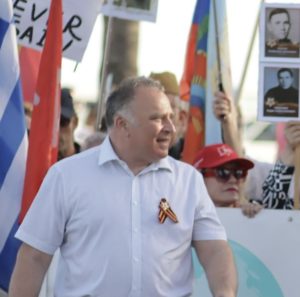
Dmitriy Apraksin
Tsakhidis, an election candidate and tourist guide, before the march in Limassol, has organized a meeting of Putin’s supporters in the central square of Paphos, where they shouted “Russia forward!” and “Victory will be ours!” They laid wreaths with Russian symbols at the monument in front of the city municipality. What kind of victory the Russian patriots were shouting about, is unknown.
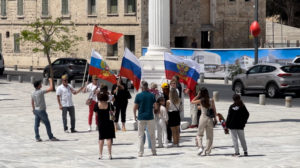
Rally in Paphos organized by Raoul Tsakhidis
The culmination of the mass event on May 9 on the Limassol Embankment was the twenty-minute speech of the candidate for the EP, Dmitry Apraksin. It was an amazing mixture of reckless lies, crazy Kremlin’s conspiracy, Moscow’s Orthodoxy and military propaganda. Another parliamentary candidate, Vladimir Gkorin, carefully translated this speech into Greek for the honorable audience sitting in the front rows.
The leader of the Hunter Party, Nicholas Prodromou, was also on stage and took the opportunity to address his potential electorate.
The massive election event ended with a ceremonial fireworks display, which was paid for by unknown patrons.
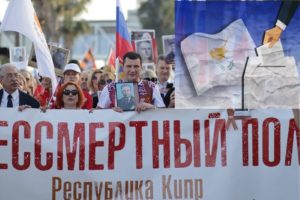
It is not surprising that there may be candidates for various elective positions in Cyprus with Russian roots. It is surprising and dangerous that among them there are so many agents of influence of Putin’s Russia, obeying orders from the Russian embassy.
In fact, a new powerful player has appeared in the internal political life of Cyprus – it is Russia, with dozens and hundreds of its agents. They are candidates from the Russian intelligence services, whatever officially they are considered independent candidates or represent certain Cypriot parties. Both are lies and disguises.
Russia has so far failed to get its candidates into the Cypriot parliament, so it seems that tactics had to be changed, focusing on the lower, municipal level. There are more chances for success here.
If Cyprus manages to have its candidates in the European Parliament, it will be a tremendous success, which we do not want.
Original: CDN

